
Hornet Control in Charleston County, SC — Fast, Family-Safe Removal
Charleston County, South Carolina, with its picturesque coastal charm and thriving historic neighborhoods, faces unique challenges when it comes to pest control, particularly with hornets and yellowjackets. The region’s warm and humid climate, along with its abundant greenery, creates ideal conditions for these stinging insects. The stunning oak trees, Spanish moss, and coastal breezes of Charleston County not only attract residents and tourists but also hornets seeking shelter. The combination of dense vegetation, saltwater marshes, and frequent storms offers ample opportunities for hornets to nest in roof eaves, porches, trees, and hidden crevices in local architecture.
For residents of Charleston County—from Downtown Charleston and West Ashley to Mount Pleasant and James Island—hornet stings pose a real risk, especially for those allergic to venom. If you’ve noticed a sudden increase in hornet activity around your home or have seen paper-like nests around your property, it’s time to take action. All U Need Pest Control specializes in hornet removal and prevention tailored specifically for Charleston County homes, offering safe, efficient, and discreet solutions for families and businesses alike.
Pest Control Services in Charleston County, SC
- Ant Control
- Bed Bug Control
- Beetle Control
- Cockroach Control
- Flea Control
- Home General Pest Control
- Millipede Control
- Mosquito Control
- Pantry Pest Control
- Rat & Rodent Control
- Scorpion Control
- Silverfish Control
- Spider Control
- Stink Bug Control
- Termite Control
- Tick Control
- Wasp Control
- Winter Control
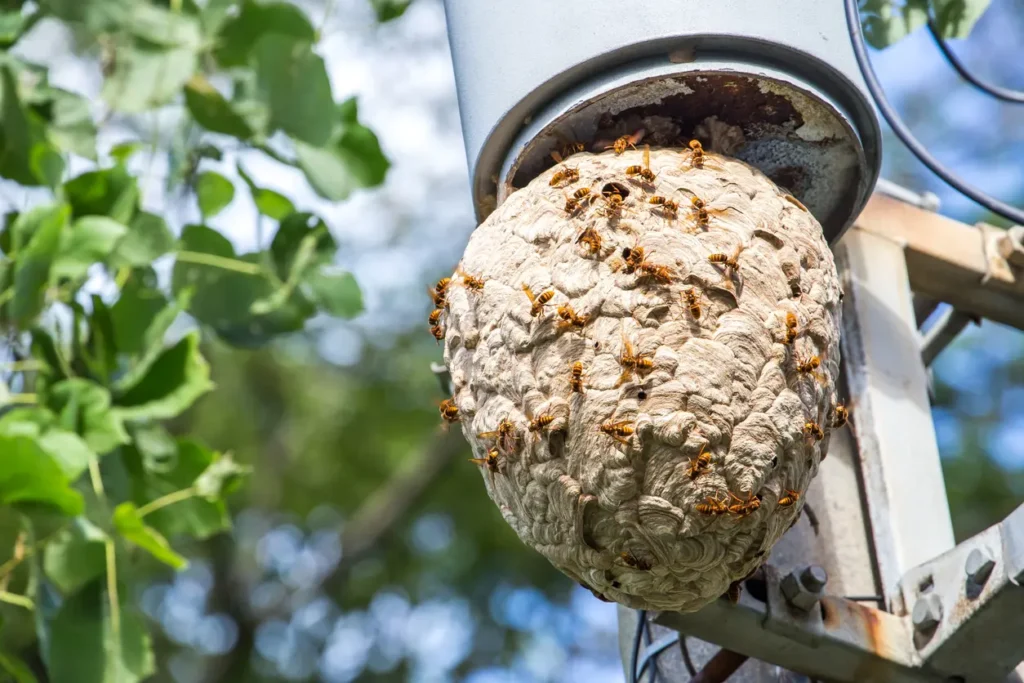
How to Get Rid of Hornets in Charleston County, SC
In Charleston County, hornets thrive in the humid, coastal environment. The warm summer months, combined with frequent afternoon thunderstorms and heavy rainfall, make it easy for hornets to establish nests quickly. DIY sprays can be tempting, but attempting to disturb or remove a hornet nest on your own can provoke an aggressive swarm, leading to potential danger. The safest, most effective approach to hornet control in Charleston County is to contact a professional pest control service that understands the local ecology and hornet species.
A skilled hornet control plan in Charleston County typically includes a comprehensive inspection, careful nest removal, targeted treatments, and preventive measures to reduce the chances of a new nest forming. Charleston County homes, many of which are built with raised foundations and wooden exteriors, require special attention to hidden voids and structural gaps, which are prime locations for hornets to build their nests. Dense shrubbery, trees, and creeping vines that characterize the local landscape may also conceal nests, making it essential to work with an expert familiar with the local environment.
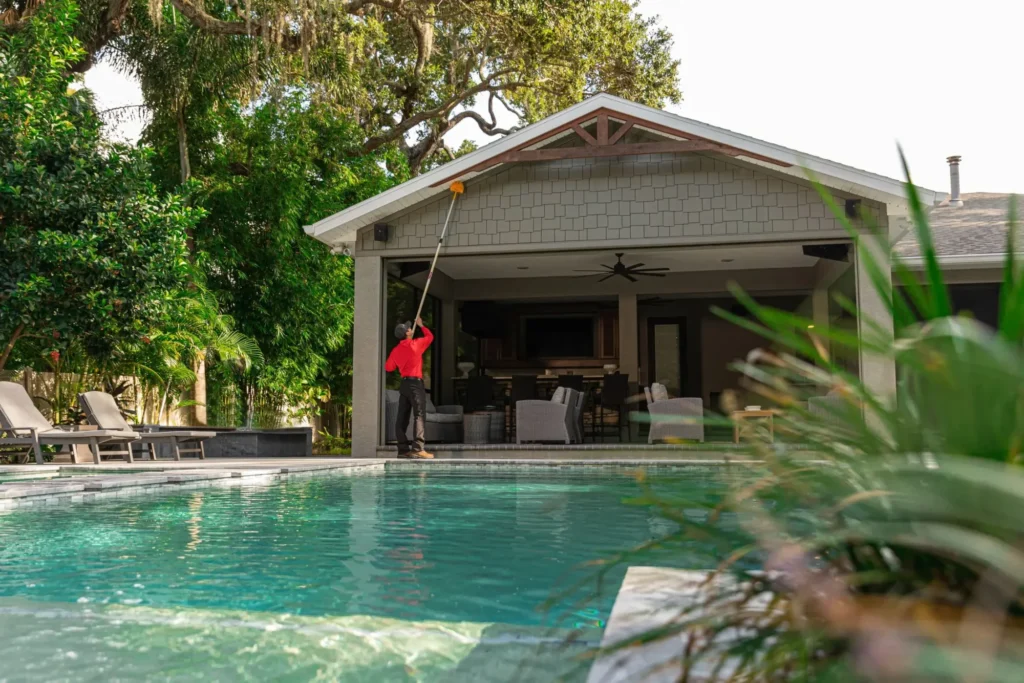
Hornet Treatment in Charleston County, SC
The coastal climate and unique architectural features of Charleston County require hornet treatment methods that are customized to local conditions. From the historic districts in Downtown Charleston to the sprawling estates of James Island and Daniel Island, we ensure that each hornet treatment plan is tailored to meet the specific needs of the home and its environment.
A Comprehensive Inspection
Our hornet control process begins with a thorough inspection of your property to identify all potential nesting sites. We examine key areas where hornets are most likely to build nests, including eaves, soffits, porch rafters, attic vents, and fence lines. In Charleston County, many homes feature raised foundations, which can provide hidden entry points for hornets, making it especially important to inspect crawl spaces and other concealed areas where hornets might nest. We also assess the surrounding landscape, such as dense shrubs, ivy, and trees, which can conceal hornet nests from sight.
Nest Removal
Safely removing nests is a delicate process that must be handled by professionals to minimize risk. We select the right time of day for removal, usually early in the morning or late in the evening, when hornet activity is at its lowest. Our team uses protective equipment and specialized tools to safely neutralize the colony, detach the nest, and dispose of it securely. For Charleston County homes with structural voids, such as gaps in the fascia or behind siding, we follow specific protocols to ensure the entire colony is eradicated and prevent hornets from relocating to hidden spaces within the home.
Targeted Treatments
We use precision treatments to target the areas where hornets are most active, ensuring quick and effective results. Unlike off-the-shelf sprays, our treatments are specifically formulated and placed in high-traffic areas, such as the entrance and exit points of nests. This ensures that hornets are neutralized before they can return to their nests or migrate to other parts of the property. In Charleston County, where dense vegetation and tree canopies provide shelter, we take extra care to treat areas like shrub canopies and tree limbs that may harbor large nests.
Exclusion
Once a nest has been safely removed, we implement exclusion techniques to prevent future infestations. We seal potential entry points such as utility and cable penetrations, gaps in soffits and fascia, and other structural weaknesses that could allow hornets to return. Additionally, we recommend modifications to the surrounding landscape, such as trimming back dense shrubs and trees, which can help improve visibility and reduce shelter for hornets looking for a new nesting site.
Integrated Pest Management
In Charleston County, where the climate is consistently warm and humid, hornet control requires an ongoing strategy. Our Integrated Pest Management (IPM) approach ensures that hornet activity is monitored and that new nests are addressed promptly. We evaluate the property after significant weather events, like storms or flooding, and adapt our strategy to suit the changing environment. With frequent rain and rapid plant growth, IPM allows us to continuously monitor hornet activity and keep your home protected year-round.
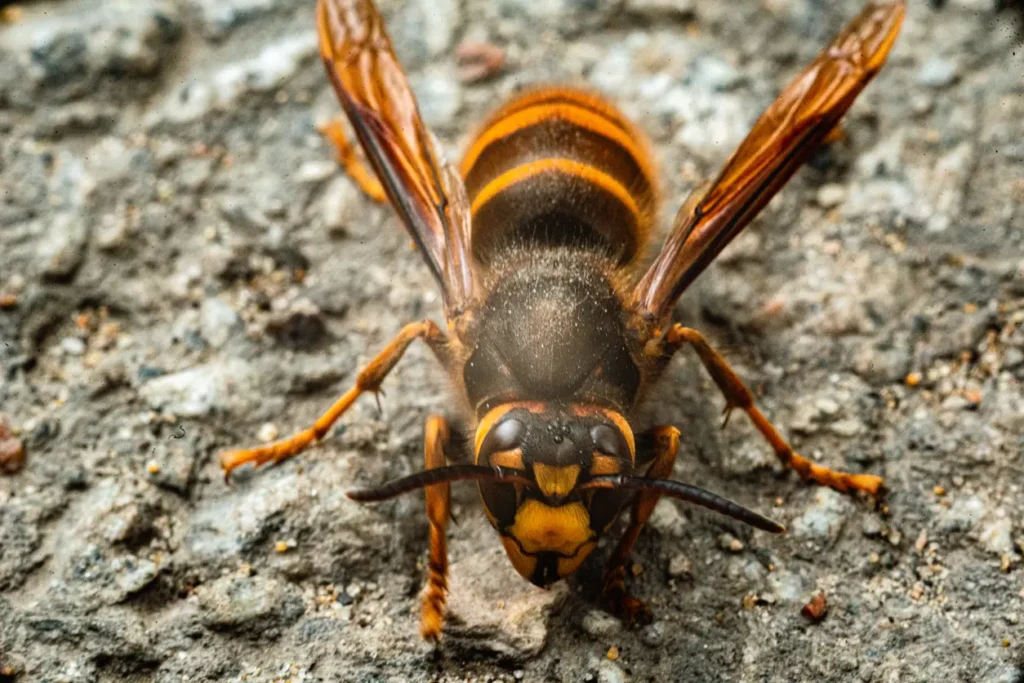
Signs of a Hornet Infestation in Charleston County, SC
Knowing the signs of hornet activity early is essential to preventing larger infestations. In Charleston County, the presence of hornets can be difficult to detect at first, especially in areas with heavy tree cover or dense shrubs that hide nests. Being aware of the common signs can help you act quickly and protect your home.
Hornet Sightings
If you notice hornets flying around the same area repeatedly, particularly near soffits, porch ceilings, or attic vents, this is a strong indicator that a nest is nearby. Hornets tend to forage for food during the day, and they often fly in a straight line from their nest to a food source and back again. In Charleston County’s historic neighborhoods and areas with heavy vegetation, it’s not uncommon to see hornets patrolling areas around outdoor dining spaces or trash bins.
Increased Hornet Activity
Hornet activity in Charleston County may spike during the warmer months and after storms. If you notice a sudden increase in hornet activity around areas like tree trunks, fences, or vine-covered walls, it may indicate the presence of a nest. In areas like James Island and Folly Beach, where large tree canopies provide ideal nesting sites, hornet populations can increase rapidly after rainfall, making it crucial to act quickly.
Hornet Nests
Hornet nests in Charleston County typically resemble a gray, papery, football-shaped structure. Bald-faced hornets, which are common in the area, prefer to build exposed nests in trees or on the sides of structures. If you spot one of these nests, avoid disturbing it, as hornets will aggressively defend their home. Yellowjackets, on the other hand, often build their nests in hidden voids, such as wall cavities or under the ground, which may make them harder to locate but no less dangerous.
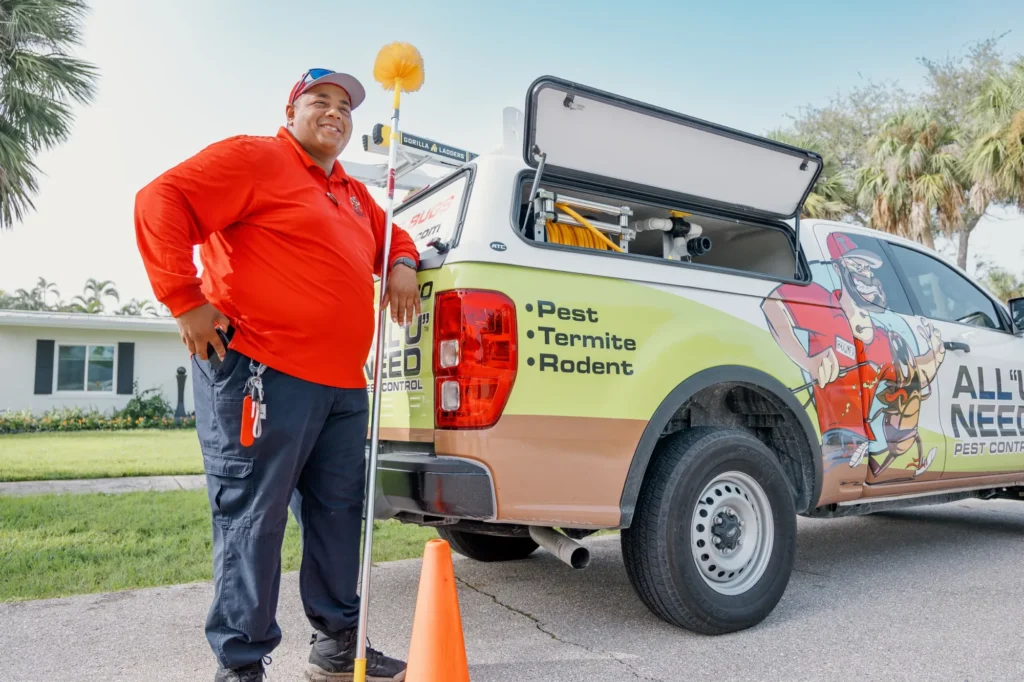
How to Check for Hornets in Charleston County, SC
If you suspect hornets are nesting near your home, it’s important to check for signs of activity from a safe distance. Early morning or late evening is the best time to observe hornet activity, as hornets are less active during these cooler parts of the day. Here are some things to look out for when checking for hornets:
- Repeated hornet flight to a specific gap, soffit edge, or vine-covered section of wall
- Paper-like nest material tucked in shrubs or higher in tree canopies
- Buzzing or tapping sounds in ceiling or wall cavities, especially near porch roofs
If you see hornets entering and exiting a hole or gap, avoid disturbing the area and contact a pest control professional. Never attempt to remove a nest yourself, as hornet stings can be dangerous.
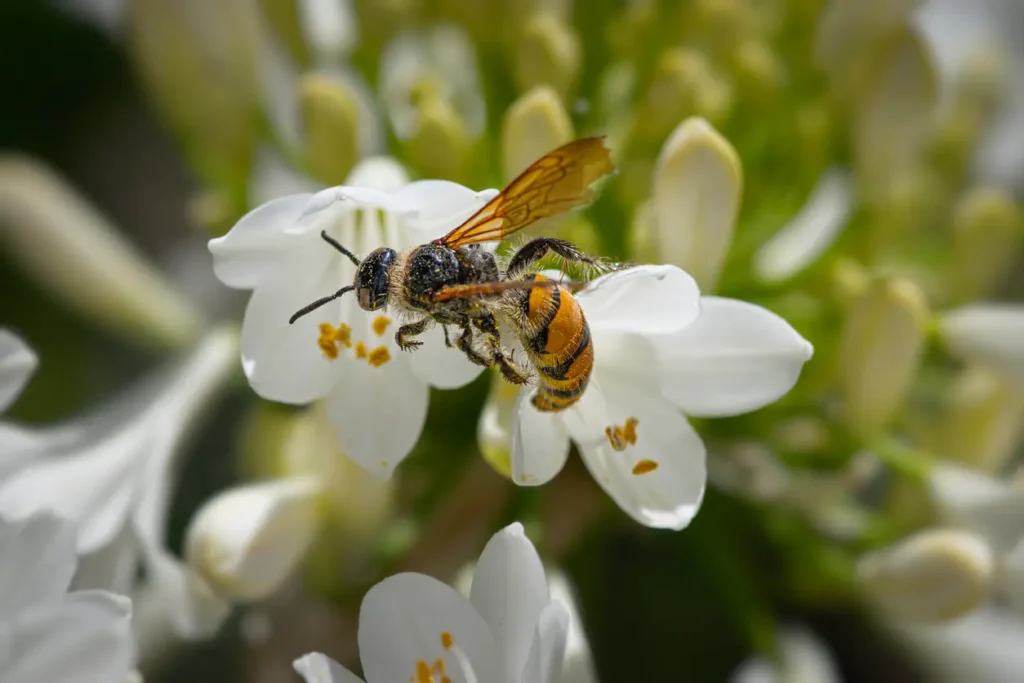
What Do Hornets Look Like in Charleston County, SC?
In Charleston County, three common species of hornets and yellowjackets are most often encountered. Understanding what these insects look like can help homeowners identify the species and take appropriate action.
Southern Yellowjacket
Southern yellowjackets are tiny, hasty insects with black-and-yellow banding. These hornets are highly aggressive when disturbed, and their nests are often located in the ground, under sheds, or inside structural voids. In Charleston County’s older neighborhoods, where homes are made of wood and masonry, these hornets frequently take advantage of cracks in siding or gaps in fascia to build their nests.
Eastern Yellowjacket
Somewhat bigger than southern yellowjackets, eastern yellowjackets are also aggressive and build their nests in ground voids, hollow walls, and attic spaces. If you notice hornets entering and exiting a small exterior opening, especially near the sill or fascia, it’s a sign that a yellowjacket colony might be nesting nearby.
Bald-Faced Hornet
Bald-faced hornets are big, black-and-white wasps known for their paper-like nests, which are usually found in trees, bushes, or under eaves. These hornets can grow large colonies that become more aggressive as the summer progresses. In Charleston County’s residential areas with lush landscaping, bald-faced hornet nests are commonly found in dense tree canopies or in the corners of porch ceilings.
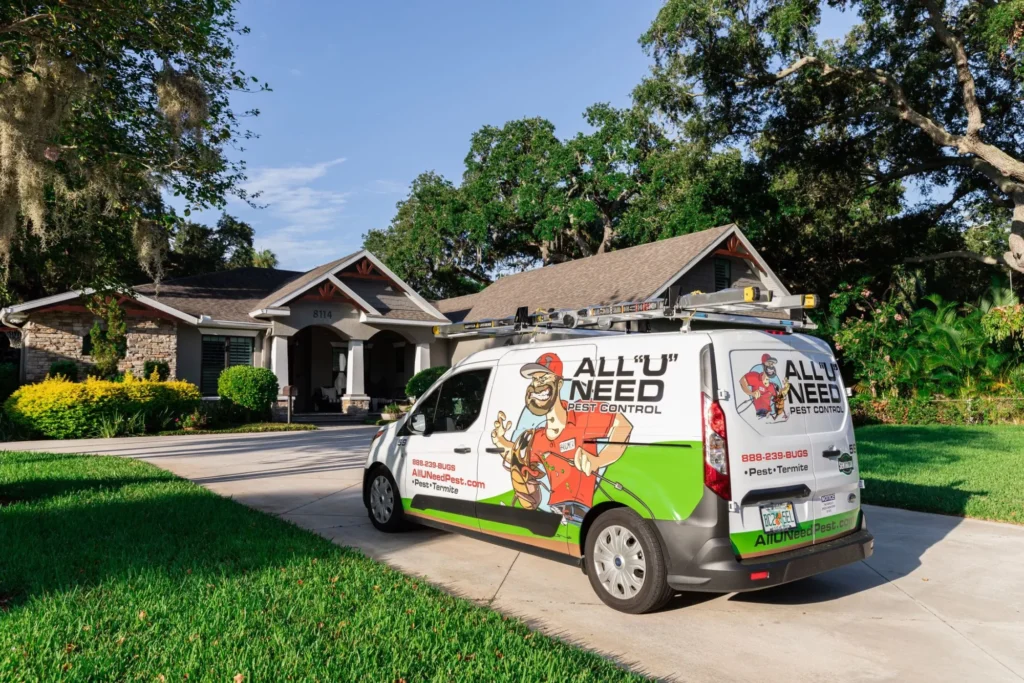
Eco-Friendly Solutions in Charleston County, SC
Charleston County, with its unique coastal environment and biodiversity, requires a thoughtful approach to pest control. As residents and visitors alike enjoy the beautiful natural surroundings, it’s important to balance hornet control efforts with eco-friendly solutions that preserve the health of the local ecosystem. All U Need Pest Control is committed to offering environmentally conscious methods that effectively manage hornet infestations without compromising the area’s natural beauty.
Natural Repellents
For certain low-risk areas, we may use natural repellents to discourage hornet nesting. These botanical-based products can help repel hornets from specific spots around your property, particularly those near gardens or water sources. While natural repellents are not a substitute for professional nest removal, they can play a role in reducing the likelihood of hornets returning to the same area. In Charleston County, where wildlife and plant life are closely intertwined, such products are ideal for sensitive areas like organic gardens or places near water features.
Habitat Modification
Modifying the habitat around your home is a crucial part of hornet prevention. Charleston County’s warm, humid climate makes it the perfect environment for hornets to thrive in sheltered spaces. By trimming shrubs, removing overgrown ivy, and clearing fallen leaves and debris, you can reduce the sheltered areas that hornets prefer for nesting. Simple modifications to your landscaping—such as planting less dense vegetation near windows and doors—can go a long way in discouraging hornets from taking up residence close to your home. Additionally, adjusting outdoor lighting to warmer tones can reduce the attractiveness of your property to nocturnal insects.
Exclusion Techniques
Exclusion plays an essential role in preventing hornets from establishing new nests around your property. In Charleston County, where many homes feature unique architectural elements such as raised foundations and wooden trim, it is crucial to address potential entry points. We use pest-rated mesh to seal gaps around attic vents, soffits, and fascia while still allowing proper airflow. We also recommend ensuring that crawl spaces are well-maintained and sealed to prevent hornets from entering. These exclusion methods not only help keep hornets out but also maintain the structural integrity of your home.
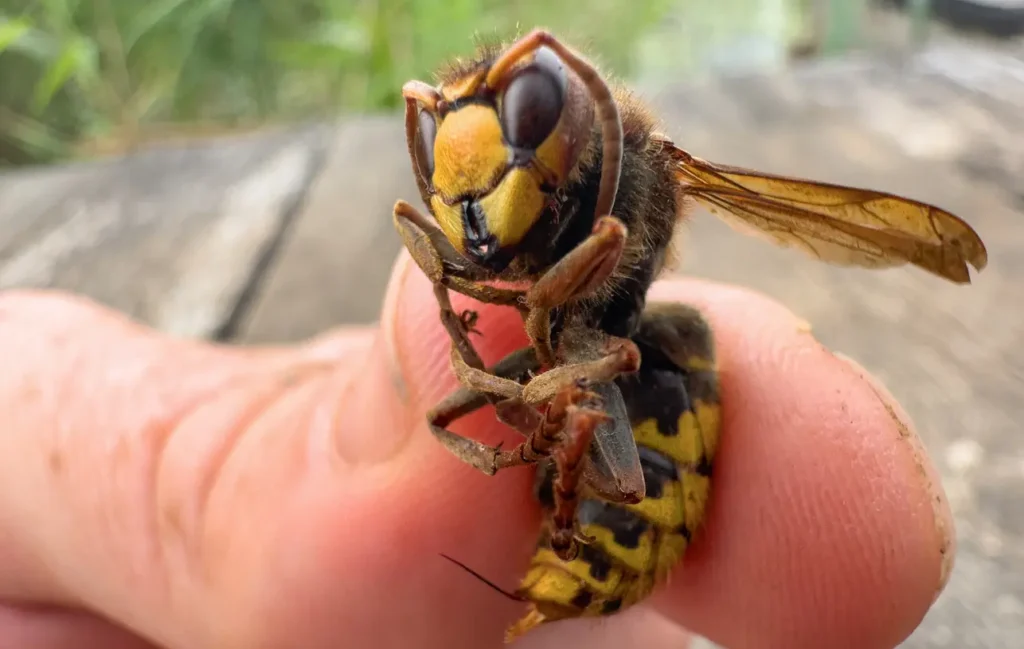
How to Prevent Hornets in Charleston County, SC
Preventing hornets from nesting around your Charleston County home starts with proactive measures that address common attractants. The region’s unique combination of coastal vegetation, high humidity, and frequent storms means that hornet activity can escalate quickly. To protect your property, it’s important to take steps now to reduce the chances of a hornet infestation later.
Reduce Outdoor Clutter
Outdoor clutter, such as stacked materials, overturned pots, and forgotten storage items, can create perfect hiding spots for hornets. In Charleston County, homes surrounded by dense vegetation, like those in parts of West Ashley or James Island, are particularly vulnerable to hornets seeking shelter in these areas. By keeping yards and patios free of unnecessary clutter, you reduce the likelihood of hornets finding sheltered areas to build their nests. Regularly cleaning up fallen branches, leaves, and debris can prevent hornets from establishing a nest in hidden areas.
Trim Vegetation
Properly maintained vegetation is one of the best ways to prevent hornet nests around your Charleston County home. Hornets are drawn to shaded, undisturbed areas, often hiding their nests in dense foliage. Regularly pruning trees and shrubs around your house helps expose potential nesting sites to sunlight and air, making them less attractive to hornets. Focus on trimming back tree branches that touch the house, as these can provide easy access points for hornets to enter attic spaces or the eaves of your home.
Get Rid of Food Waste
Hornets are attracted to food sources, particularly sugary substances. To keep hornets away from your home, it’s important to remove any potential food sources. In Charleston County, where outdoor living is popular, it’s common for hornets to be attracted to outdoor dining areas, trash bins, and recycling containers. After meals, make sure to clean up any leftover food, especially sugary drinks, fruit scraps, and trash. Rinsing out cans and bottles before recycling and regularly cleaning grill surfaces after cookouts can also prevent hornets from being drawn to your property.
Seal Trash Cans
Trash cans can attract hornets, particularly if they are left open or not properly sealed. In Charleston County, where food waste can accumulate quickly during the summer months, it’s crucial to use trash bins with tight-fitting lids and to keep them a reasonable distance from your home. Make sure to take out the trash regularly, especially during peak hornet activity times in late summer and early fall. Tightening the lids and keeping trash cans away from porch areas or windows will reduce the likelihood of hornets foraging around your home.
Cover Holes in Your Lawn
If you discover small holes or burrows in your yard, it’s important to have a professional inspect them. Some hornets, particularly yellowjackets, prefer to nest in abandoned rodent holes or small voids in the ground. In Charleston County, where wildlife and pests are common, these holes can serve as ideal nesting sites for hornets. Filling in holes without checking first could push hornets toward your home, so it’s best to have an expert evaluate the situation to prevent further issues.
Additional Preventive Measures :
- Minimize bright porch lighting during peak flight times or use warmer-spectrum bulbs that are less attractive to insects
- Keep outdoor dining areas covered and clean between uses to prevent attracting hornets
- Install hornet-aware signage in your yard or near active areas to inform guests about the potential risk during treatment periods
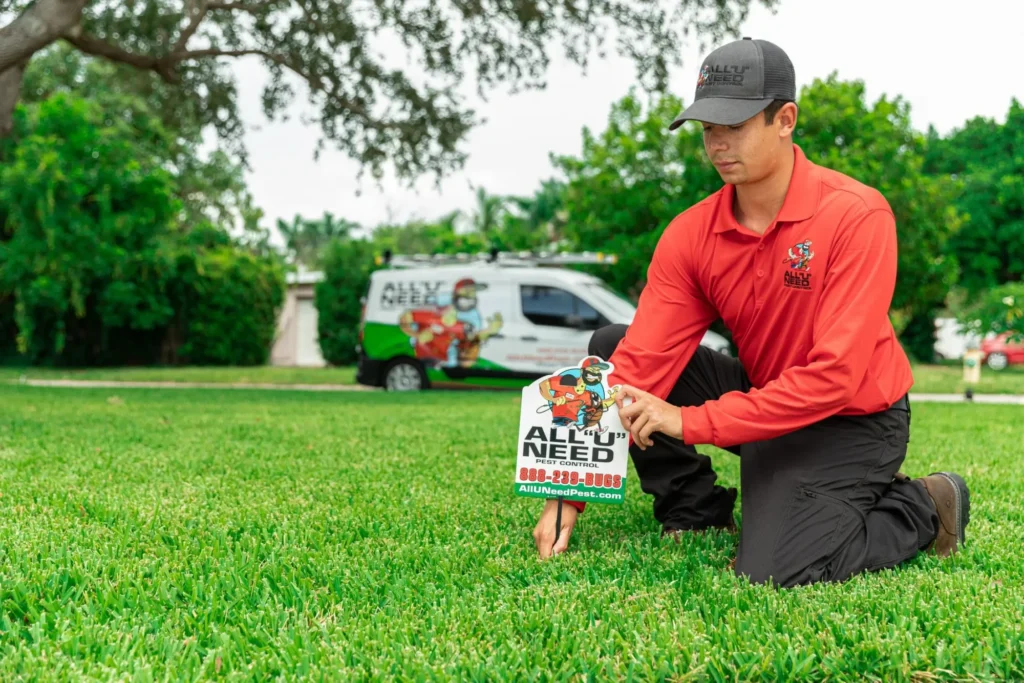
Why Choose All U Need Pest Control for Hornet Control in Charleston County, SC?
Hornet control in Charleston County demands a combination of local expertise, professional experience, and environmentally conscious practices. At All U Need Pest Control, we specialize in providing effective, tailored hornet removal solutions that cater to the unique climate, architecture, and landscaping of Charleston County. Whether you live in the historic districts of Downtown Charleston, the suburban neighborhoods of West Ashley, or the lush coastal areas of James Island, we ensure your home is protected from hornet infestations.
Our team is committed to offering fast, safe, and discreet hornet control that minimizes disruption to your daily routine. We take the time to understand the specific needs of your property and provide ongoing monitoring and prevention strategies to keep your home hornet-free. With decades of experience serving Charleston County, we offer transparent pricing, clear communication, and a satisfaction-first approach.
If you’re ready to reclaim your home from hornets, call us today at 1 (888) 239-BUGS or reach out online for a free consultation. Let All U Need Pest Control inspect, remove, and protect your property so you can enjoy Charleston County’s stunning outdoors without the worry of stings.
Location Contact:
419 N Cedar St Summerville, SC 29483
Get Directions for 419 N Cedar StSummerville, SC 29483 on Google Maps843-489-8818
Call All "U" Need Pest Control